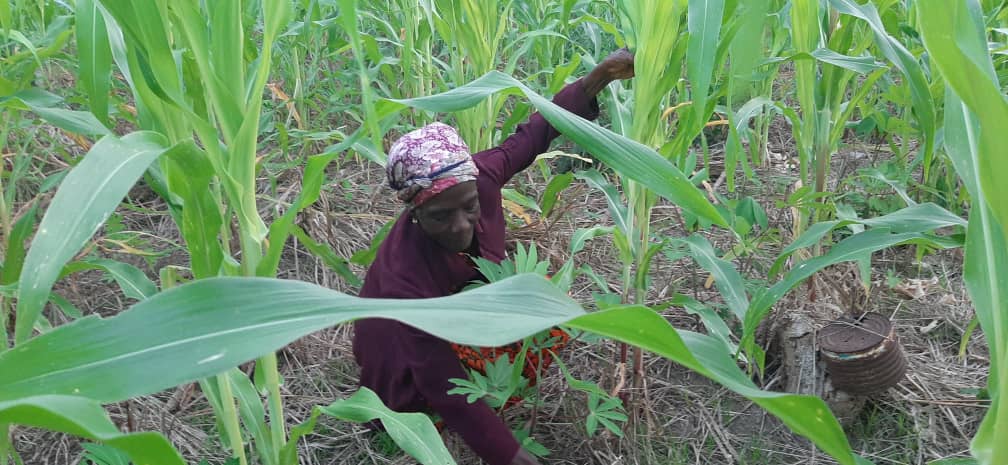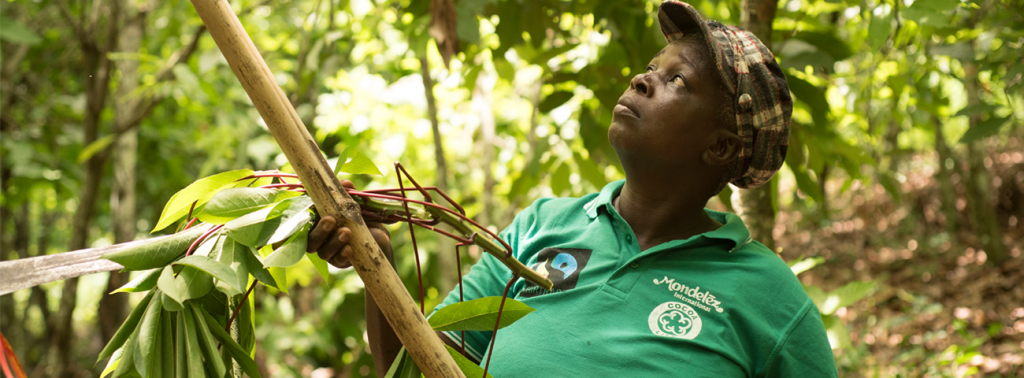In 2016, the Fairtrade-Mondelēz International partnership evolved from certification of the Cadbury Dairy Milk brand to collaboration with Cocoa Life, Mondelēz International’s global cocoa sustainability programme, to support farming communities.
Since then, we have worked together to create value for cocoa farmers, their communities and wider society by combining our organisations’ strengths. We stand as equal partners in the belief that the impact of joint working exceeds what could be accomplished alone.
The partnership with Cocoa Life works with the seven cocoa farming unions in Ghana which originally supplied Fairtrade cocoa to Cadbury. Under the partnership, Cocoa Life committed to offer cocoa farmers in Ghana guaranteed high-volume purchases, clear terms of trade, and loyalty payments, which together with programme investments, are to deliver value per farmer at least equivalent to that previously delivered by Fairtrade Premiums. Mondelēz International committed to rolling out Cocoa Life across all Cadbury brands rather than just Dairy Milk, allowing for significant growth in the volumes covered by the partnership.
Partnership statements
Fairtrade and Cocoa Life have agreed on principles and a framework that would help assess progress towards achieving our partnership objective – to build resilient livelihoods and economic growth for cocoa farming communities. Fairtrade publishes annual progress reports on the partnership, using volumes and payments data received from FLOCERT. We have been able in 2021 to bring the reporting up to date, so the latest report covers the period to 2019-20.
The latest Partnership Statement lays out progress to date of the partnership including successes of the Climate Change and Organisational Strengthening Programme (CCOSP) incorporating additional funds from the UK’s Foreign, Commonwealth and Development Office, and publication of the Sustainable Livelihoods report.
Volumes have more than doubled since the start of the partnership. Farmers are benefitting from these purchases, the CCOSP programme and from the Cocoa Life program, and in November 2021 the Partnership Steering Committee welcomes two cocoa union representatives. Areas for improvement continue to be provision of written contracts and timely payments, which Cocoa Life are working with their supply chains to address.
Climate change and organisational strengthening programme
Our joint programme on climate change, income diversification and organisational strengthening, priorities articulated by the cocoa unions in Ghana, is half-way through implementation, with 18 months remaining before the programme finishes at the end of 2022. In July 2020, Fairtrade and Cocoa Life were successful in securing additional funding from the UK’s Foreign, Commonwealth and Development Office (FCDO), to build on the existing programme to make sure that farming families could be resilient in the context of COVID-19, and to accelerate and deepen work on income diversification through the addition of a grant facility.
Over the past 18 months, training has been provided to 115 lead farmers on business and organisational strengthening and technical trainings to support income diversification. Grants were awarded to 9 unions to start income diversification activities with promising results for improving food security and increasing resilience. 94 union leaders have been trained on coop strengthening, grant management, environmental management, governance and leadership. Over 7,000 farmers have been trained on climate change impact and adaption strategies. 419 community animators have been trained to train communities and facilitate development of community adaptation action plans.

I was part of the climate change sensitisation and training in my community and I have learnt some climate smart agricultural practices. With the knowledge I received from the training, I do not burn on my farm. I practice zero tillage and also use animal manure to mulch my maize farm and if there is enough, I use it on my cocoa farm too
Gifty Dede, farmer in the Baasare Nkwanta area
Cocoa Sustainable Livelihoods Landscape studies
As part of our partnership, since June 2018 the Fairtrade Foundation has carried out a research project known as the Sustainable Livelihoods Landscape Study. The first phase of this study completed a landscape analysis and comparative review of Sustainable Livelihoods Initiatives in Ghana and Cote D’Ivoire, where 60% of global cocoa is produced annually. It also identified strengths, weaknesses, duplications, gaps and opportunities within current approaches and extrapolated an industry-level sustainable livelihoods theory of change. This work was published in May 2020.
In the first phase of this research we achieved a clear understanding of the current landscape within the sector. We are now at the stage of exploring what needs to happen (and change) to achieve sustainable livelihoods for cocoa farming communities in West Africa – and defining a role for our partnership on this journey.
The second phase of the research will cover the following objectives:
i. Develop a roadmap to achieve sustainable livelihoods for cocoa-growing communities in West Africa and drive definition of a new way for national, regional and international actors to partner in this endeavour
ii. Ensure that the initiatives within the defined roadmap will be set up to target the needs and constrains of the most marginalized groups – such as non-organized farmers; informal labor; sharecroppers; geographically isolated
iii. Define a strong alignment of intents between the sector and the farmers in order to identify a list of areas for farmer-centric interventions that will contribute towards the sustainability roadmap
By the end of this phase, we will have produced a publication defining a future vision for the cocoa sector to achieve sustainable livelihoods that the partnership will disseminate and use to catalyse transformative and lasting change for the cocoa farming communities.
